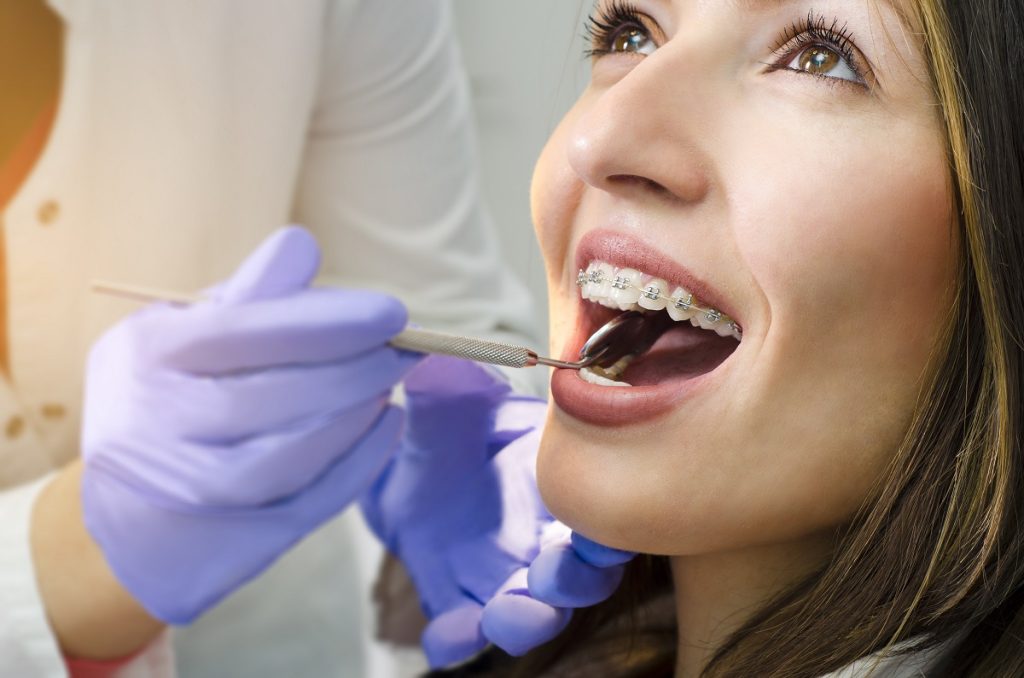- Tooth decay, or cavities, is an enamel erosion caused by acids from bacteria in the mouth.
- Gum disease, or periodontal disease, is an infection affecting the tissues that surround and support your teeth.
- Tooth sensitivity is discomfort or pain when teeth are exposed to hot, cold, sweet, or acidic foods and drinks.
- Bad breath (halitosis) is caused by bacteria in the mouth, especially on the back of the tongue or between the teeth.
- Misaligned teeth, or malocclusion, can lead to difficulty chewing, speech issues, and an increased risk of dental decay and gum disease.
Taking care of your oral health is essential for maintaining a beautiful smile and overall well-being. Regular dental check-ups and good oral hygiene practices can help prevent or mitigate these dental problems. This guide will learn about each issue’s causes, symptoms, and treatment options to empower you to take charge of your dental health.
1. Tooth Decay
Tooth decay, commonly referred to as dental caries or cavities, is a highly prevalent dental concern on a global scale. This condition arises when detrimental bacteria in the oral cavity generate acids that gradually deteriorate the enamel, which serves as a protective outer layer of the tooth. You might experience sensitivity, pain, or visible holes in your teeth if you have cavities. To prevent tooth decay, brush your teeth twice daily using fluoride toothpaste and floss daily to remove plaque and food particles between your teeth. Regular dental check-ups are crucial for detecting and treating cavities early on. Your dentist might recommend dental fillings, crowns, or root canal treatment, depending on the severity of the decay.
2. Gum Disease

Periodontal disease refers to an infection affecting the tissues that surround and support your teeth. It is usually caused by the buildup of plaque and tartar along the gumline. Early symptoms may include red, swollen, or bleeding gums, and as it progresses, it can lead to gum recession and tooth loss. To prevent gum disease, maintain good oral hygiene practices and schedule regular dental cleanings. In its early stages (gingivitis), gum disease is reversible with professional dental care and improved oral hygiene. However, if it advances to periodontitis, more extensive treatments like scaling and root planing, antibiotics, or even gum surgery might be necessary.
3. Tooth Sensitivity
Tooth sensitivity is a common dental problem characterized by discomfort or pain when your teeth are exposed to hot, cold, sweet, or acidic foods and drinks. It occurs when the tooth’s protective layer (enamel) is worn down, exposing the sensitive dentin underneath. Receding gums or teeth grinding can also lead to tooth sensitivity. Using a soft-bristled toothbrush and desensitizing toothpaste can help alleviate mild sensitivity. Avoiding acidic and sugary foods and drinks and wearing a nightguard if you grind your teeth can also be beneficial. If the sensitivity persists or worsens, consult your dentist, who may recommend treatments like fluoride varnishes, dental bonding, or gum grafts, depending on the cause and severity.
4. Bad Breath (Halitosis)
Persistent bad breath, or halitosis, can be an embarrassing and socially isolating dental issue. It is often caused by bacteria in the mouth, especially on the back of the tongue or between the teeth, leading to the breakdown of food particles and the release of foul-smelling gases. Maintaining good oral hygiene by brushing your teeth, tongue, and gums and flossing regularly is essential in combating bad breath. Staying hydrated, avoiding tobacco products, and limiting strong-smelling foods can help. If bad breath persists despite these efforts, it could indicate an underlying dental or medical condition, and you should seek advice from your dentist or physician.
5. Misaligned Teeth
Misaligned teeth, also known as malocclusion, are a common dental issue that affects the alignment of your teeth and jaws. It can lead to problems such as difficulty chewing, speech issues, and an increased risk of dental decay and gum disease due to hard-to-reach areas. Remember, addressing misaligned teeth improves oral health and boosts self-confidence with a beautiful, aligned smile.
Here are some tips for managing misaligned teeth:
Visit a Dentist or Orthodontist
If you’re concerned about your misaligned teeth, the best place to start is to visit a dentist or orthodontist who can assess the situation and determine the best course of action for your specific case. The professional will be able to explain any treatment options available and address any questions you may have.
Practice Good Oral Hygiene

Practicing good oral hygiene when dealing with misaligned teeth is important, as it can help prevent gum disease and other issues associated with malocclusion, such as tooth decay. This includes brushing your teeth at least twice a day for two minutes each time, flossing daily, and using mouthwash to rinse away any leftover food particles.
Consider Orthodontic Treatment
Investing in reliable orthodontics, such as braces, can help move your teeth into their proper positions and improve jaw alignment. Braces can also reinforce the arch of your teeth, allowing them to fit together more comfortably. Your orthodontist will be able to explain the different types of braces and help you determine which one is best for you.
Use Proper Eating Habits
Your dentist or orthodontist may recommend certain eating habits to help manage your misaligned teeth and protect your oral health. This could include avoiding hard foods such as ice cubes, popcorn kernels, and almonds that can damage your braces or aligners and cutting food into smaller pieces for easier chewing.
In Summary
By understanding the five most common dental issues and their treatments, you are better equipped to maintain optimal oral health. Remember to brush and floss daily, visit your dentist regularly, and adopt a healthy lifestyle to prevent these dental problems from occurring or worsening. Your smile is a valuable asset, so take care of it to enjoy a lifetime of healthy teeth and gums.


